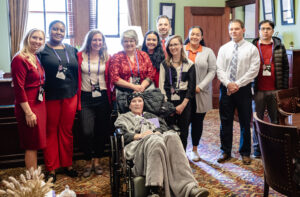
Meet the Keislers! Brandon and Haley are just like many parents—they value quality time together, they care about who is around their children and how they are learning, and their sons are their number one priority. But one thing sets the Keislers apart from most families: Their sons both have Pelizaeus-Merzbacher’s disease (PMD), and they rely on home care to keep Maxwell and and Matthew safe and comfortable, together at home as one family. But the shortage of home health workers has affected the Keislers and their sons’ care over the past six years.
The Keisler sons are able to stay at home because they qualify for in-home services through South Carolina’s Medicaid waiver programs. They are wheelchair-bound, unable to stand, sit, or walk on their own, and they must be fed, clothed, and bathed by a capable adult. Their personal care aides help them with activities of daily living (ADLs) such as bathing, toileting, and dressing.
“Home care enables our family to stay together, and enables us all to maintain normal lives despite our unique conditions,” said father Brandon. “Without our aides, we would not be able to work outside of the home to provide for our sons, and we certainly would not be given the flexibility to be able to go grocery shopping, take them to their doctor’s appointments, or maintain a normal sleep schedule. These kids are incredible, and the least they deserve is to grow up at home as a family like other kids.”
Max and Matthew’s mom, Haley, points to pitfalls that the home care industry faces. “If an aide calls out, that means one of us has to call out from work that day. There aren’t enough quality aides to keep up with the demand,” she said. “Although Max and Matt have physical limitations, mentally they are normal like you and me. They need to be stimulated so that they can continue to learn and grow. We need aides who are truly compassinate and caring. But it’s hard to find quality aides because they are constantly leaving to go to better paying jobs. In the past six years, many of our caregivers have left, and this creates a revolving door for our family and leaves gaps in our coverage.”
Brandon and Haley have experienced multiple agencies discharging their sons from services due to lack of staff. “We are finding it more difficult to find home care agencies that provide personal care services to the pediatric population. From what we have been told, it’s mostly due to the state’s low reimbursement rates,” explained Brandon.
The issues lies in South Carolina’s current reimbursement rate for Medicaid personal care services. The state reimburseses providers for their home care services, and that reimbursement rate must cover aides’ wages, training, supplies, and other overhead costs. Though the bulk of the reimbursement rate goes directly to the aide’s wage, it is not enough to compete with fast food and retail settings, where their starting minimum wages often vastly exceed reimbursement rates. If more and more aides continue to leave the profession, South Carolinians and others like the Keislers throughout the country will not have access to the in-home care that keeps their family together and keeps their sons out of institutional settings.
“Currently, we have a great personal care aide who loves what she does, loves our boys, and rarely calls out. When we leave the house, we know the boys are in good hands, and that allows me to be able to focus at my job. We know she does it for all the right reasons, but also needs to pay her mortgage and care for her family. We are hopeful our lawmakers can see the benefits of having personal care aides in the home. We feel she deserves to make a million dollars! Although we know that is not realistic, we need help from our legislators to keep her in our home. An increase in the reimbursement rate for personal care services will allow her and many others to do what she loves to do–care for our boys when we are not there to be able to,” said Haley as Brandon nodded in agreement.
This issue is so important for the Keislers because they know their sons will need personal care services throughout their lives, and they have even begun advocating for their issues. They recently joined the South Carolina Home Care & Hospice Association at their annual Legislative Day and brought Maxwell and Matthew along to their meetings with Representatives Jimmy Bales, Terry Alexander, and Roger Kirby. When asked if he had a message for legislators, Brandon said, “What a special day for all of us! We truly thank you all for what you do. We know being a lawmaker is also not the easiest job, but supporting South Carolina’s personal care aides and supporting home care truly makes a huge different in our and many others lives.”
To support home care and prioritize it over institutional care, legislators in South Carolina and in other states can support a Medicaid reimbursement rate increase for personal care and skilled nursing in-home services. Increased rates allow providers to pay caregivers higher wages, which enables them to recruit and retain more quality caregivers and prevent workers from leaving the profession for retail and fast food settings. This in turn will allow more individuals and families to access home health care and remain in their homes and communities.
To read more from Haley’s perspective, read her op-ed. ABC Columbia recently covered the Keislers’ story. Click here to view the piece.
To learn more about how home care, how it benefits your constituents, and how providers struggle to recruit and retain quality caregivers due to low reimbursement rates, please email [email protected]







